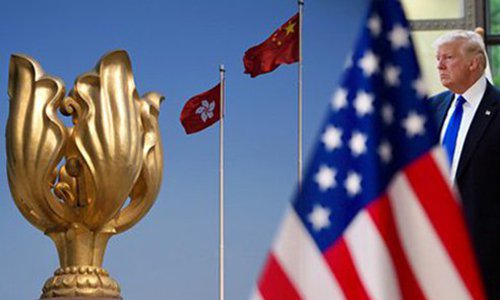HOME >> OPINION
US wants to use HK turmoil to weaken China
Source:Global Times Published: 2019/9/1 20:23:40

Photo: VCG/Xinhua
Hong Kong has been reeling with chaos for over two months. Illegal rallies during which some rioters attacked police with Molotov cocktails and bricks were organized on Saturday, and the boycott of classes by students, which will pose a severe challenge to the Hong Kong Special Administrative Region (SAR) government and Hong Kong police, is imminent.
Ignited by opposition to an extradition bill, the chaos in Hong Kong has developed into unrest in which opposition forces, together with external forces, fuel anti-government sentiment and launch political movements in order to seize control of Hong Kong SAR. These forces intend to cooperate with US attempt to comprehensively contain China.
Hong Kong is an open city, where various Western institutions and organizations, which have incited and promoted color revolution in other countries and regions, have had an impact on some media outlets, student unions, political parties and labor unions by funding, training, advising them or organizing social movements.
Western media outlets have been constantly whipping up public sentiment in favor of anti-government forces, piling pressure on the Chinese central government, the Hong Kong SAR government and the Hong Kong police in the international community.
Some US and Western politicians support opposition forces in Hong Kong and threatened Beijing with "profound consequences" including sanctions if the Chinese central government mobilizes the Hong Kong Garrison of the Chinese People's Liberation Army or the People's Armed Police to intervene directly.
In the backdrop of China-US rivalry, Washington intends to contain Beijing's rise. Realizing Hong Kong cannot play the role of promoting China's "peaceful evolution," the US hopes to mess up Hong Kong, creating trouble for Beijing and eroding the country's national power.
What some US politicians have recently said shows the US intends to link the Hong Kong affair with the trade talks between the two giants. US Vice President Mike Pence said on August 19 that "it would be much harder for us to make a [trade] deal if something violent happens in Hong Kong." Mike Pompeo, US Secretary of State, said on August 20 that Beijing and Washington may not reach a deal if the Chinese central government violently cracks down on the mass protests in Hong Kong.
However, China-US trade negotiations will have to take diverse interests into account, ranging from finance to technology. Amid the current China-US strategic competition, the Hong Kong problem is a US bargaining chip to negotiate with China, but not a decisive one.
Although the Chinese central government hopes the chaos in Hong Kong can end as soon as possible, it will not make concessions in trade talks with the US with regard to the Hong Kong affair.
Many are concerned whether or when the Chinese central government will step in to resolve the turmoil in Hong Kong.
The Chinese central government has made it clear that it firmly supports the Hong Kong SAR government in governing the city according to law, the Hong Kong police in strictly enforcing the law and the Hong Kong SAR judiciary in punishing violent criminals. It has constantly warned the US and other Western countries not to meddle with the Hong Kong affairs.
The patriotic forces in Hong Kong, standing with the SAR government, are fighting against Hong Kong anti-government forces and their Western supporters. Though the chaos may not end very soon, the probability of violence waning is high, but for the odd flare-up at critical moments.
The escalation of violence over the past few months has upset many ordinary Hongkongers and the public will voice louder opposition to violence. At the same time, police would step up measures to curb violence. So far, a number of rioters have been arrested. Therefore, it's likely that violence would gradually reduce. But protests may continue for a while because protesters have not obtained what they want - such as the right to universal suffrage.
The article was compiled by Global Times reporter Lu Yuanzhi based on an interview with Lau Siu-Kai, Emeritus Professor of Sociology at the Chinese University of Hong Kong and Vice-President of the Chinese Association of Hong Kong & Macao Studies. opinion@globaltimes.com.cn
Posted in: OBSERVER